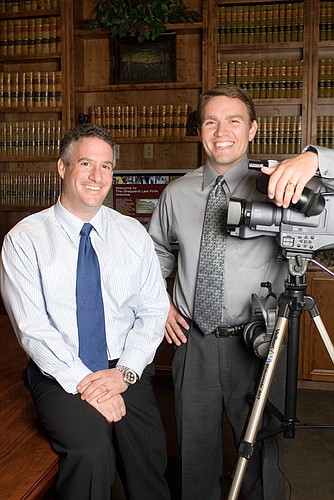Estate-planning attorneys focus on helping affluent people organize their finances before they die. A Fort Myers law firm has launched a program to help middle-income families with the same kinds of issues.
Like most estate-planning attorneys, Craig Hersch and Michael Hill help affluent people organize their finances before they die.
It makes sense that they should focus their practice on the wealthy. For one thing, estates don't have to pay death taxes until assets hit the $3.5 million threshold this year. And neither Hersch nor Hill comes cheap. Hersch, 45, bills $400 an hour and Hill, 32, bills $300 an hour for their Fort Myers-based firm, Sheppard, Brett, Stewart, Hersch, Kinsey & Hill.
But Hersch and Hill will be launching an estate-planning program in the middle of this month that costs $1,950 for Hope Hospice patients of much more modest means. The idea is to help terminally ill patients and their families organize their finances before they die and do it for a reasonable yet profitable fee.
The Hospice Family Program is the first of its kind for any hospice and an unusual expansion for any estate-planning law practice. Few estate-planning firms help less affluent people unless it's on a volunteer basis.
But estate planning has become much more complicated than just writing a will for middle-income families who can't afford sophisticated legal advice. Even the rules for beneficiaries of Individual Retirement Accounts (IRAs) are confusing and mistakes can be costly.
When Hersch was invited to speak to a group of hospice patients and their families recently, questions ranged from whether children inherited their parents' debts to how to navigate the probate process. Second marriages can complicate matters further, especially if there are children from both relationships.
“He saw a need that wasn't being met,” says Samira Beckwith, president and chief executive officer of Hope Hospice. Beckwith says over 100 people overflowed the meeting room at Hersch's first talk.
“The only way to make money is to leverage technology,” says Hill, a self-described technology nerd and former trumpet player in the Florida Gators marching band.
With a staff of 15 people, Hersch and Hill have over the years designed a paperless computer system that coordinates the estate plans of 400 wealthy families representing about 2,000 people. The firm has about 20,000 wills and trusts on file.
Once they sign up for the program, the hospice patients and their families do much of the upfront work of gathering and organizing their financial documents. Then, they watch a series of instructional videos that saves the partners time explaining the estate-planning process. In the end, much of the relatively simple work can be farmed out to the firm's staff.
The two partners figured that the efficient system they developed could be used to help hospice patients and their families with routine estate-planning solutions, from correctly titling property to reviewing wills and handling probate.
They figured they could do it by charging $1,950 and still make a profit. “I wanted to make it affordable,” says Hersch, who notes that drafting a trust document starts at $1,500.
Hersch acknowledges that the $1,950 fee may be too low. He expects to make money on the simple cases and perhaps lose some money on more complex ones. “We'll adjust it on the fly,” he says.
The partners aren't worried that the 4,000 patients who pass through Hope Hospice every year will overwhelm their practice. “If 5% sign up, it's a huge success,” Hersch says. “This is an offshoot of our bread-and-butter work.”
Beckwith says those who are likely to take advantage of the help are those who don't have an estate-planning attorney. “I think the people who are going to be interested in this are those who are trying to do it by themselves,” she says.
Anyhow, Hersch and Hill say they get pleasure from helping less fortunate people. “The thrill is the challenge,” he says. “There's something special about helping others.”
But the partners are prepared to take the hospice program further if it's successful. “If this works here, I'd like to take it across the state. This is like the lab,” says Hersch, who has trademarked the process. Besides, they can hire extra paralegal staff if the need arises.
Still, there's nothing to prevent competitors from doing the same. Florida Bar ethics rules prevent the Sheppard firm from soliciting hospice patients; they have to request the service and Hope can't get a cut of the fee.
Anyhow, Hope Hospice wouldn't block other attorneys from offering a similar service. Beckwith says she'd love to have a dozen estate-planning attorneys help her patients. “It would be a great problem to have,” she laughs.






